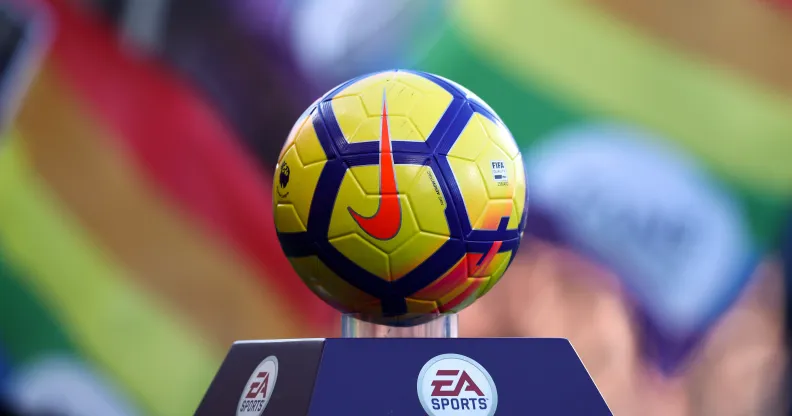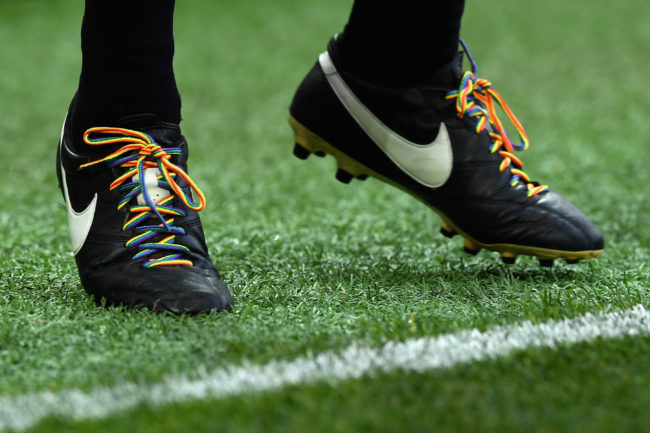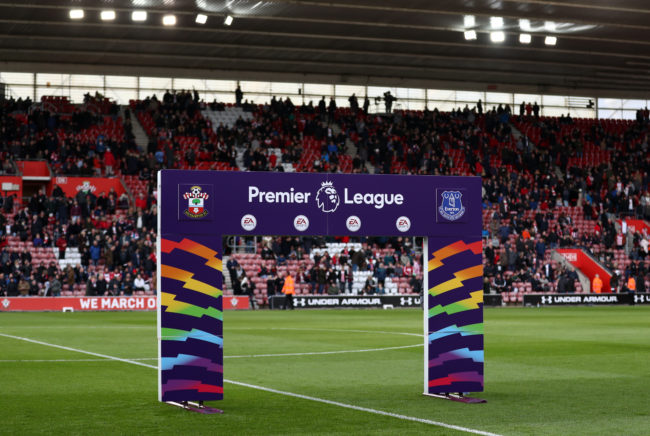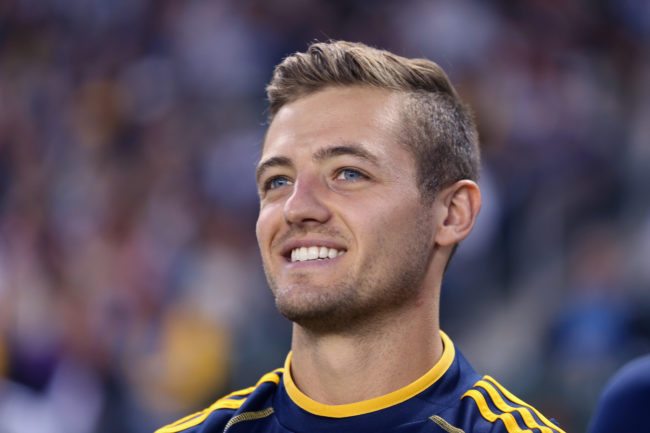Homophobic abuse at football matches surges, statistics show

The Nike match ball infront of rainbow flags during the Premier League match between AFC Bournemouth and Newcastle United at Vitality Stadium on February 24, 2018. (Catherine Ivill/Getty)
Reports of homophobic abuse around football matches continues to sharply rise, according to new data.
Data released on Wednesday (November 28) by the organisation Kick It Out, which works to combat racism, homophobia and discrimination in football, shows that reports of hate incidents are up dramatically year-on-year.
There were 111 reports of homophobic abuse incidents around football matches in the 2017/18 season, a 9 percent increase from the previous report.

Match official wears rainbow laces to fight homophobia in sports. (Gareth Copley/Getty)
Six transphobic incidents were also reported in 2017/18.
Racist incidents remain the most prevalent, with 273 reported incidents over the past year, up 22 percent year-on-year.
Homophobic abuse in football is on the rise
The Kick It Out statistics cover all levels of the game, including the Premier League, English Football League (EFL), FA Women’s Super League, non-league and grassroots fixtures.
“Football cannot be complacent about the risk to the game this represents.”
— Lord Ouseley, Kick It Out
Kick It Out chair Lord Ouseley said in a release: “It is hugely disappointing to have to reveal, yet again, increasing levels of all forms of discriminatory abuse at football.
“While the increased reports reflect a greater inclination among fans to complain about unacceptable abuse, these trends reflect, in part, what is happening in the rest of society. Hate crime reports have doubled over the last year to more than 94,000.”
He added: “Football cannot be complacent about the risk to the game this represents. Much good work has, and is, being done to prevent and counter unacceptable behaviour. But, the professional leagues and their clubs must do more in a coherent and consistent way – exemplifying all the best practices applied by some clubs – to drive hateful and abusive spectators out of the game.
“Equally, The FA and its county associations, as well as local leagues, must step up their actions to ensure compliance and enforcement at grassroots level.”
Kick It Out’s Troy Townsend told BBC Sport that the figures were only a “snapshot of what is happening in stadiums” because the figures are reliant on people reporting hate incidents to the organisation.

A rainbow arch for the rainbow laces campaign during the Premier League match between Southampton and Everton at St Mary’s Stadium on November 26, 2017 in Southampton, England. (Catherine Ivill/Getty)
The English Football League told the broadcaster: “The EFL remains committed to working with the relevant parties to ensure football provides a welcoming environment for all those supporters attending matches.
“We continue to work closely with EFL clubs, Kick it Out and other relevant bodies to ensure improved reporting mechanisms are in place and we believe this is now making this process easier and more manageable for fans.”
There are no out men in English professional football
Footballers have previously spoken about a culture of homophobia within the sport.
There are no openly gay male footballers in the top tiers of the sport in the UK, and persistent reports suggest that major stars in the closet feel terrified to come out.
The last player to come out while playing was Justin Fashanu, who came out in 1990 but died by suicide in 1998 after years of homophobic abuse.
Former Leeds United player Robbie Rogers and former Aston Villa player Thomas Hitzlsperger have both come out as gay in recent years, but only after retiring from English football.

Robbie Rogers only came out after he left England (Jeff Gross/Getty)
David Haigh, Leeds United’s gay ex-Managing Director, said in October 2017 that around 20 gay footballers are in the closet, adding: “They are still playing, in the Premier League, and the Championship.”
Haigh explained that footballers were reluctant to come out publicly because “young stars advertise brands with sponsors, and being gay is still seen as a handicap.”
He added: “To be suddenly known for their sexuality would be unsettling.
“Football needs to have people come out. The first guy to do it would be brave, yes, but they would also get a lot of support.
“I don’t think gay footballers would face a terrible time today. I think that players who came out would receive support. I hope it would not be like Justin Fashanu.
“I think things have changed massively since then, so I would hope the reaction would not be the same today.”

